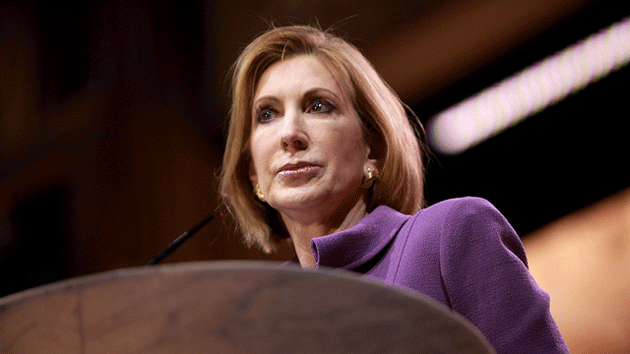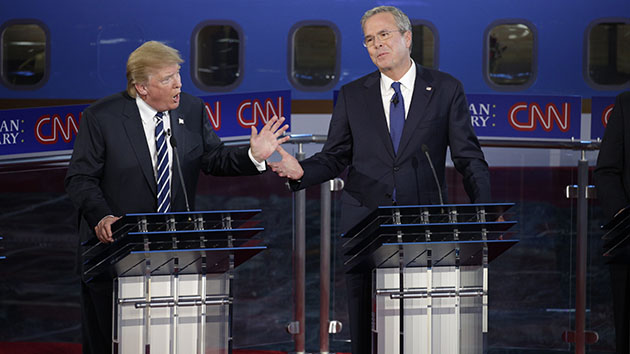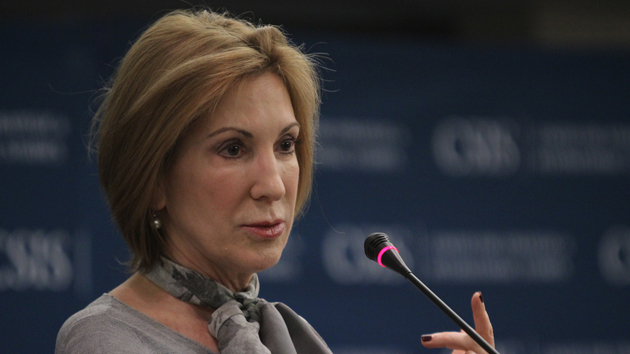
<a href="https://www.flickr.com/photos/gageskidmore/13045502775/in/photolist-kSMBtD-vwjFEJ-kSNbNT-vNjUyA-kSMA7F-vwrQKn-vNjWcL-vwjxRA-kSMwXz-kSMCZp-kSPqTq-kSNoVZ-rvWCue-vSKQMz-253BEv-wXxeyh-tBAHMt-r7BiDE-qsbQe1-rpbgJT-rp44T8-rmTkM9-rp4uz2-qsc62C-qspeJc-r5RFA8-rp4sbe-r7Jkoi-rpbdye-r7AY2U-r7JnKx-tvhQQS-sxUkFY-t2xa6N-rW3C3g-uYb9zi-2JZAq-qfvew-sdKKvt-sqttEQ-sdmeuU-sSC769-82bKxy-qfvfq-qfvdv-uxXLXp-vNVLWK-vNjXsm-vwjvfW-sx4Lyb">Gage Skidmore</a>/Flickr
If anyone won Wednesday’s GOP debate, it was probably former Hewlett-Packard CEO Carly Fiorina, who gained the most in Twitter followers, Google searches, and media chatter by positioning herself as a steadier, smarter, more mature alternative to Donald Trump. Fiorina’s responses on everything from Russia to immigration and abortion seemed to project confidence and a knowledge of the issues. And she was the only candidate who managed to hit Trump with a solid punch, framing his comments about her looks as a subtle indictment of his attitude toward women.
But there’s a problem with Fiorina’s bid to become a Trump slayer: She and Trump may actually have too much in common.
To be sure, it doesn’t matter (and may even help) that Fiorina is, like Trump, a wealthy businessperson with no experience in elected office—assuming she can position herself as a business leader with a real grasp of the issues. Yet that might be easier said than done.
Consider Fiorina’s seemingly intelligent response to how she would get the Russians out of Syria:
What I would do, immediately, is begin rebuilding the Sixth Fleet. I would begin rebuilding the missile defense program in Poland, I would conduct regular, aggressive military exercises in the Baltic states. I’d probably send a few thousand more troops into Germany. Vladimir Putin would get the message. By the way, the reason it is so critically important that every one of us know General Suleimani’s name is because Russia is in Syria right now, because the head of the Quds Force traveled to Russia and talked Vladimir Putin into aligning themselves with Iran and Syria to prop up Bashar al-Assad.
Contrasted with Trump’s rambling, specifics-free answer to that question, her message was clear: I know what I’m talking about. But does she? Here’s Ezra Klein’s dissection on Vox:
The Sixth Fleet is already huge, and it’s hard to say why adding to its capabilities would intimidate Putin—after all, America has enough nuclear weapons pointed at Russia to level the country thousands of times over. Her proposal for more military exercises in the Baltics seemed odd in light of the fact that President Obama is already conducting military exercises in the Baltics. And the US already has around 40,000 troops stationed in Germany, so it’s hard to say what good “a few thousand” more would do. And pushing on a missile defense system in Poland is a very long-term solution to a very current problem. In total, Fiorina’s laundry list of proposals sure sounded like a plan, but on inspection, it’s hard to see why any of them would convince Putin to change course.
Klein found similar inconsistencies in Fiorina’s discussion of immigration and Planned Parenthood.
So Fiorina is more stylistically than substantively a wonk, and maybe she can get away with that for a while. But given that she has called Trump an an “entertainer” and a “clown,” it might not help that she is politically best known in California as, well, a bit of a laughingstock. During her 2010 bid to win California’s GOP Senate primary and take on Sen. Barbara Boxer, she commissioned what may be the world’s most bizarre campaign ad—viral for all the wrong reasons.
Maybe Fiorina has grown up since then. But far worse for someone who wants to be known as the “serious” candidate is her voting record—or lack thereof. Here’s Michael Hiltzik in the Los Angeles Times:
Even before her 2010 campaign against Boxer could get off the ground, it was poleaxed by the revelation that she had failed to cast a ballot in 75 percent of the California elections for which she was an eligible voter. She missed presidential primaries in 2000 and 2004, and the primary and general elections in 2006, including a Senate reelection run by Democrat Dianne Feinstein. She skipped the primary and general elections in 2002, a gubernatorial election year, as well as the historic recall vote that brought Arnold Schwarzenegger to the governor’s seat.
At the time, Fiorina lamely explained that she had “felt disconnected from the decisions made in Washington” and “didn’t think my vote mattered.” Yet, as Hiltzik noted at the time, HP spent $4.7 million on Fiorina’s watch to lobby Congress and made $390,000 in political donations. Fiorina clearly believes in the political system—just not the one regular people have to use.
And maybe that’s okay, at least in the GOP primary. After all, Trump was unapologetic during the debate when Jeb Bush challenged him over his past donations to Democrats. It’s just part of being a successful businessman, he insisted. Another CEO candidate could have thrown Trump’s comments back at him by noting that he actually isn’t very successful at all—as Kevin Drum has pointed out, Trump would have probably been wealthier than he is today had he simply taken his inheritance and put it in an index fund.
But Fiorina isn’t the best person to land that punch. As David Corn notes, her track record at HP was only slightly better than pathetic:
In February 2005, she was pushed out of HP. The company’s board, with which she had been battling for years, had had enough of her. The Compaq merger had not yielded the benefits—improved shareholder returns and greater profits—she had promised. At the time of her dismissal, Hewlett-Packard stock was trading at about the same price as when she first unveiled the Compaq deal. Eighty percent of the company’s operating profits were coming from its old-line printing business. She had not succeeded in reviving HP as a computer-selling powerhouse. The day she was dumped, the company’s stock price rose 7 percent. That was Wall Street exclaiming, Hooray. As Robert Cihra, an analyst with Fulcrum Global Partners told Money magazine, “The stock is up a bit on the fact that nobody liked Carly’s leadership all that much. The Street had lost all faith in her and the market’s hope is that anyone will be better.”
None of this means that Fiorina wouldn’t make a better president than Trump. But if she really is the best person to knock him off his pedestal, the GOP may be in real trouble.













